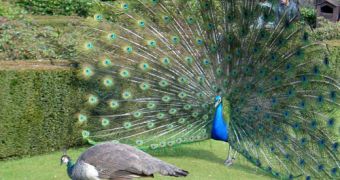Sex and economics seem to be connected: animals tend to invest in their offspring according to their expected payoff. A team of behavioral ecologists at the National Museum of Natural History and the Laboratory of Evolutive Parasitology, Paris showed that, in the peafowl (Pavo cristatus), when females mated with attractive males, they invested more resources in their eggs than females paired with less attractive males. In the first case, the females laid larger eggs and deposited more testosterone in egg yolk, offering a better start in life to their offspring.
A 1994 research revealed that peahens mated to peacocks with more ornamented Tails delivered offspring that grew faster and had a higher survival rate. These aspects were explained by the transmission of "good genes" from the attractive fathers.
Still, "we now know that the energy spend by the mother in egg production, and especially the allocation of resources such as proteins, lipids, antibodies or testosterone in the eggs can significantly improve offspring growth and survival prospects" said lead researcher Dr. Adeline Loyau, now at the Helmholtz Centre of Environmental Research (UFZ) in Leipzig.
The team mated peahens with peacocks presenting various eyespot densities, an attractive character to females and collected the produced eggs. The eggs were measured and while artificially incubated their testosterone level was determined. "Females paired with males with higher eyespot density spent more energy in the reproduction. They laid bigger eggs containing more testosterone. Doing so, these females potentially prepare a better future for their offspring as in other species, such eggs are known to increase egg hatching success, chick growth, mobility and survival, and even future social rank and attractiveness." said Loyau.
In this case, why don't females invest the maximum in any of their eggs?
"The total energy a female can spend in her life is limited, so she has to save it until she can expect a good payoff from her expense," explained Loyau.
"In a previous experiment, we demonstrated that attractive males are also males in better health and with a better immune system. When a female mates with an attractive male, she can expect offspring of good quality. For example, more attractive offspring, and offspring that will better survive. Our results suggest that the peahens choose to put all their eggs in one basket by favoring chicks with good paternal genes through maternal investment" she concluded.

 14 DAY TRIAL //
14 DAY TRIAL //